“This New Focus On The More Real, Intimate Side Of Girlhood Has Been Largely Rewarded By Viewers And
“This new focus on the more real, intimate side of girlhood has been largely rewarded by viewers and corporate partners alike. But what makes young women in particular so poised to take up this conversation, and ultimately profit from the interest of their (largely female) audience? For one, demonstrating high levels of personal and emotional intelligence is a prerequisite for being an idealized vision of a successful young woman. Many of these emerging trends in pop culture — yes, even in niche YouTube videos — indicate society’s intense interest in women developing a heightened awareness of the self. Feminist theory has long held that women practice self-surveillance (and therefore self-discipline) because of the immense pressures they face. From the expectation that girls know their specific body “type” (curvy on top! petite! pear-shaped!) to find the ideal jeans fit, to the myriad wellness and self-help circuits that focus on turning inward to find healing, to the health and diet fads that are rooted in self-diagnosis and self-treatment, girls and women are believed to find success through knowing and monitoring themselves intensely. The question is, if more and more gurus are turning inward, seemingly more interested in taking care of the self, then how do they continue to encourage other people to buy products that are largely focused on outward appearance? That’s where their established position as beauty experts comes into play. Buying products is one thing — but buying the right products signifies self-knowledge and the ability to care for oneself. Retail spending is blended with political and social freedom, something girls’ studies scholar Anita Harris calls a “linking of neoliberal ideologies about individual choice with a distorted kind of feminism.” Girls’ ability to make purchases is often seen as empowering, in its display of personal wealth amassed and its demonstration of knowing oneself best. The young women on YouTube have deftly manipulated this ethic to their advantage. There are only so many videos one can make about eyeshadow palettes or bubble bath before finding a new narrative through which to talk about them.”
— How YouTubers Like Zoella Capitalize On The Self-Care Movement (via thecrownedgoddess)
More Posts from Purposefullylackadaisical and Others
No two women have the same experience. All feminism is founded not on actual essential unity, but on political coalition and affirmation of shared political needs and goals.
Race, culture, class, birth assignment, religion, and countless other factors mean all women experience womanhood differently. Excluding trans women because we have a different life experience misses the point that all women have different life experiences. This idea isn’t even new, its not even specific to trans women, its literally the point Crenshaw and Collins and Mohanty and countless other woc and third world feminists have been making for decades now.
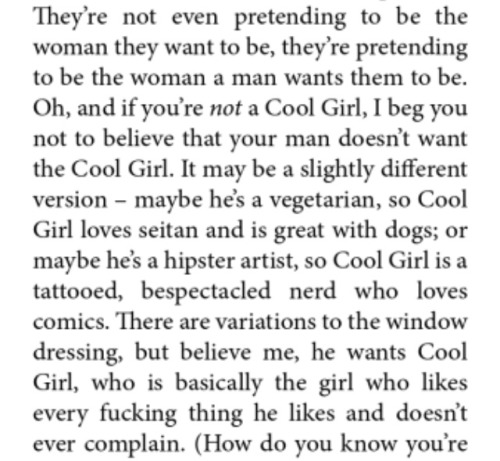
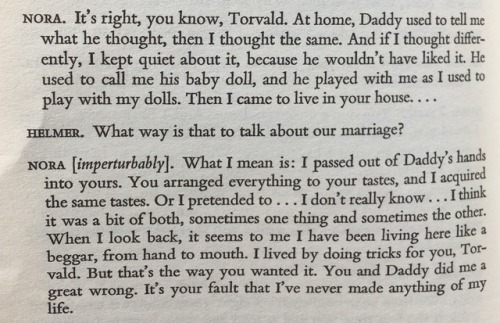
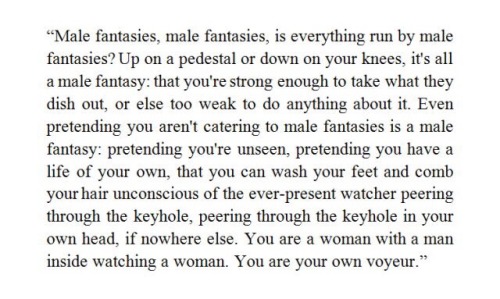
a short collection on catering to men. Gone Girl by Gillian Flynn (2012) A Doll’s House by Henrik Ibsen (1879) The Robber Bride by Margaret Atwood (1993)
“Male culture ensures that women’s anger is not taken seriously (and thus that women’s anger will not lead to social change) by defining anger in women as pathological. Broverman et al. (1972) found that mental health professionals judged aggression to be a trait associated with a healthy man, but not a healthy woman. Feinblatt and Gold (1976) found that more girls than boys were referred to children’s mental health centers for being defiant and verbally aggressive. Aggressive girls described in hypothetical case studies were rated both by graduate students in psychology and by parents as more disturbed, as being more in need of treatment, and as having poorer prognosis than boys described with identical problems. Hochschild (1983) found that males who displayed anger were thought to have deeply held convictions, while females were considered personally unstable.”
— Dee L. R. Graham, Loving to Survive (via reading-blog)
Hi, could you please make a web weaving about the childhood that you know won't come back?

oumaima, I Will Be Leaving the Party Early

@traumacure (x)

Li-Young Lee, A Hymn to Childhood

Taylor Swift, Never Grow Up

Gregory Orr, Origin of the Marble Forest

Andy Muschietti directing It: Chapter Two (via)

Mitski, Two Slow Dancers

Adonis, Celebrating Childhood (trans. Khaled Mattawa)
if any of yall are interested in poetry and learning how to read, analyse, and appreciate a poem, check out this free course by the University of York that goes in-depth about reading poetry! i’m taking it now and it’s really good, 10/10 would recommend to anyone who is even a little bit interested in poetry
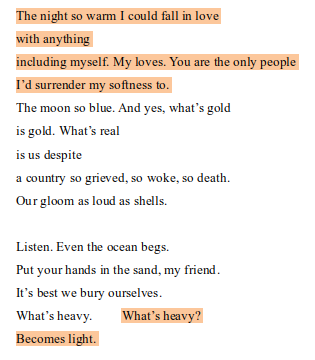






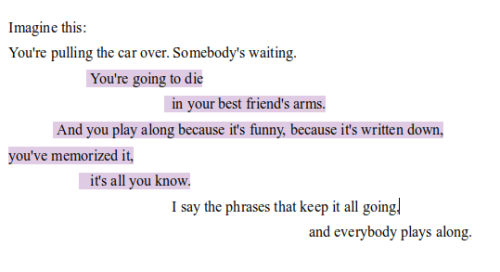












On Friendship, Falling in Love and Falling Apart, pt. 2 (pt. 1, pt. 3, pt. 4)
Ode to Friendship, Noor Hindi
The Truth Has Three Sides, Sabrina Benaim
I've Got a Dark Alley and a Bad Idea That Says You Should Shut Your Mouth (Summer Song), Fall Out Boy
Autumn, Patty Dickson Pieczka
Unknown
Unknown
Nature Poem, Chen Chen
Planet of Love, Richard Siken
Ever Yours: The Essential Letters, Vincent Van Gogh
Just Like Heaven, The Cure
Speeches for Dr. Frankenstein, Margaret Atwood
The Dialogue of Desire and Guilt, J.D. McClatchy
Someplace Like Montana, Ada Limón
Cold Solace, Anna Belle Kaufman
Fleabag (2016-2019)
Litany in Which Certain Things Are Crossed Out, Richard Siken
Your Love Finds Its Way Back, Sierra DeMulder
The Diaries of Katherine Mansfield
Moments, Mary Oliver
“Lily thought about Marilyn [Monroe]. Then she said, ‘It’s a funny thing about Marilyn. Nobody would be very happy if she were alive, except maybe me. You know how in the tabloids they’re always finding Elvis and JFK alive and living in South America or something? But they never find Marilyn, even though she’s just as famous. Well, they don’t find her, because they wouldn’t want to find her old.”
— Siri Hustvedt, The Enchantment of Lily Dahl
sorry to chime in but thought i’d bring up ada limón’s someplace like montana where she also calls her friend by the name - not as blatantly about friendship, but it is about making plans/dreams with friends even if you end up in different paths. one of my favourite poems ever <3
YES i love this poem too!!! the ending especially made me go ! the first time i read it. to paraphrase ada limón i love the way people love <3
“Medusa lost her beauty—or rather, it was taken from her. Beauty is always something you can lose. Women’s beauty is seen as something separate from us, something we owe but never own: We are its stewards, not its beneficiaries. We tend it like a garden where we do not live. Oh, but ugliness—ugliness is always yours. Almost everyone has some innate kernel of grotesquerie; even fashion models (I’ve heard) tend to look a bit strange and froggish in person, having been gifted with naturally level faces that pool light luminously instead of breaking it into shards. And everyone has the ability to mine their ugliness, to emphasize and magnify it, to distort even those parts of themselves that fall within acceptable bounds. Where beauty is narrow and constrained, ugliness is an entire galaxy, a myriad of sparkling paths that lurch crazily away from the ideal. There are so few ways to look perfect, but there are thousands of ways to look monstrous, surprising, upsetting, outlandish, or odd. Thousands of stories to tell in dozens of languages: the languages of strong features or weak chins, the languages of garish makeup and weird haircuts and startling clothes, fat and bony and hairy languages, the languages of any kind of beauty that’s not white. Nose languages, eyebrow languages, piercing and tattoo languages, languages of blemish and birthmark and scar. When you give up trying to declare yourself acceptable, there are so many new things to say.”
— What If We Cultivated Our Ugliness? Jess Zimmerman (via kuanios)

franny choi
-
 purposefullylackadaisical reblogged this · 1 year ago
purposefullylackadaisical reblogged this · 1 year ago -
 sillylangs liked this · 4 years ago
sillylangs liked this · 4 years ago -
 contourcreme liked this · 6 years ago
contourcreme liked this · 6 years ago -
 my-luminous-flux liked this · 6 years ago
my-luminous-flux liked this · 6 years ago -
 wirbelwindria reblogged this · 6 years ago
wirbelwindria reblogged this · 6 years ago -
 happy-terf-blog liked this · 6 years ago
happy-terf-blog liked this · 6 years ago -
 mexicanhex reblogged this · 6 years ago
mexicanhex reblogged this · 6 years ago -
 whyinthewild liked this · 6 years ago
whyinthewild liked this · 6 years ago -
 radaraxia reblogged this · 6 years ago
radaraxia reblogged this · 6 years ago -
 ig-baphomettebaddie reblogged this · 6 years ago
ig-baphomettebaddie reblogged this · 6 years ago -
 whiteskirting reblogged this · 6 years ago
whiteskirting reblogged this · 6 years ago -
 whiteskirting liked this · 6 years ago
whiteskirting liked this · 6 years ago -
 origamifatalist reblogged this · 6 years ago
origamifatalist reblogged this · 6 years ago -
 origamifatalist liked this · 6 years ago
origamifatalist liked this · 6 years ago -
 radfemblack reblogged this · 6 years ago
radfemblack reblogged this · 6 years ago -
 radfemblack liked this · 6 years ago
radfemblack liked this · 6 years ago -
 radfeminismes reblogged this · 6 years ago
radfeminismes reblogged this · 6 years ago -
 elitepetite liked this · 7 years ago
elitepetite liked this · 7 years ago -
 coralinegirl reblogged this · 7 years ago
coralinegirl reblogged this · 7 years ago -
 yellowedout reblogged this · 7 years ago
yellowedout reblogged this · 7 years ago -
 cryospheric reblogged this · 7 years ago
cryospheric reblogged this · 7 years ago -
 tresfandom liked this · 7 years ago
tresfandom liked this · 7 years ago -
 judithbutlersdealer reblogged this · 7 years ago
judithbutlersdealer reblogged this · 7 years ago -
 breathing-erin liked this · 7 years ago
breathing-erin liked this · 7 years ago -
 chad8472 reblogged this · 7 years ago
chad8472 reblogged this · 7 years ago -
 thefemmenextdoor reblogged this · 7 years ago
thefemmenextdoor reblogged this · 7 years ago -
 elysian-visions reblogged this · 7 years ago
elysian-visions reblogged this · 7 years ago -
 relivethememories reblogged this · 7 years ago
relivethememories reblogged this · 7 years ago -
 triplehamburgerjack reblogged this · 7 years ago
triplehamburgerjack reblogged this · 7 years ago -
 triplehamburgerjack liked this · 7 years ago
triplehamburgerjack liked this · 7 years ago -
 susurrations liked this · 7 years ago
susurrations liked this · 7 years ago -
 skeletondragon liked this · 7 years ago
skeletondragon liked this · 7 years ago -
 pumpumdemsugah liked this · 7 years ago
pumpumdemsugah liked this · 7 years ago
95 posts